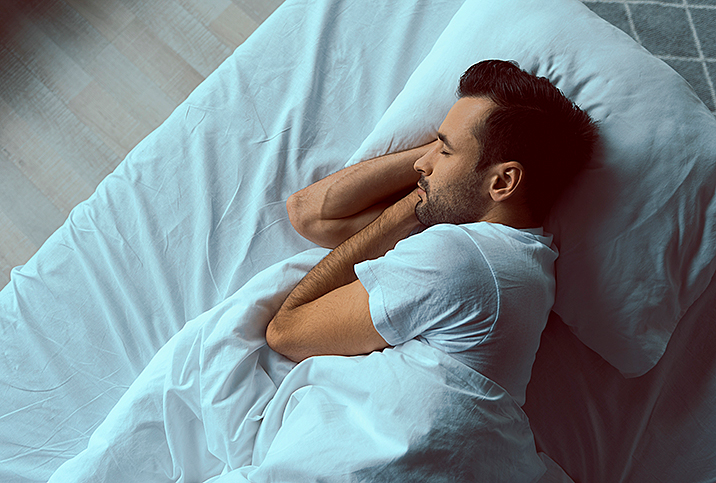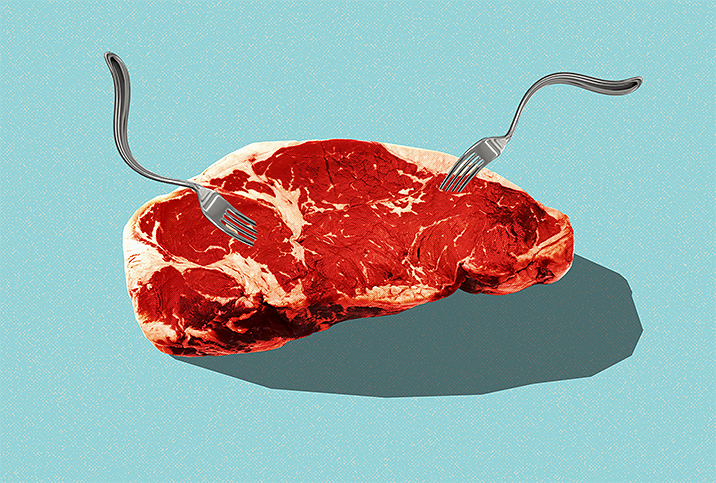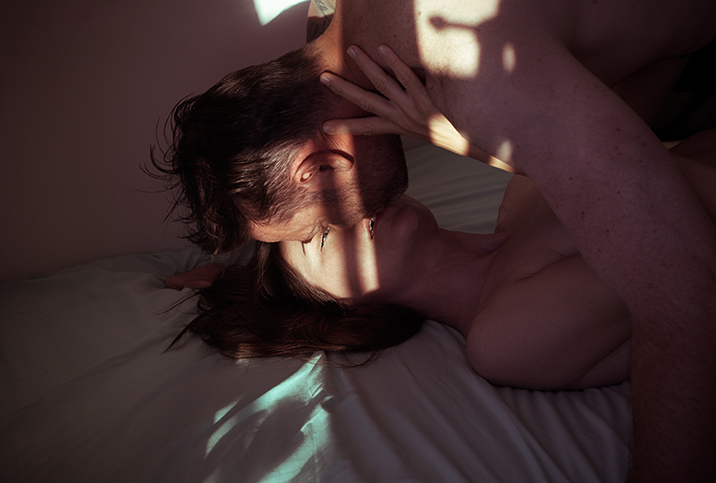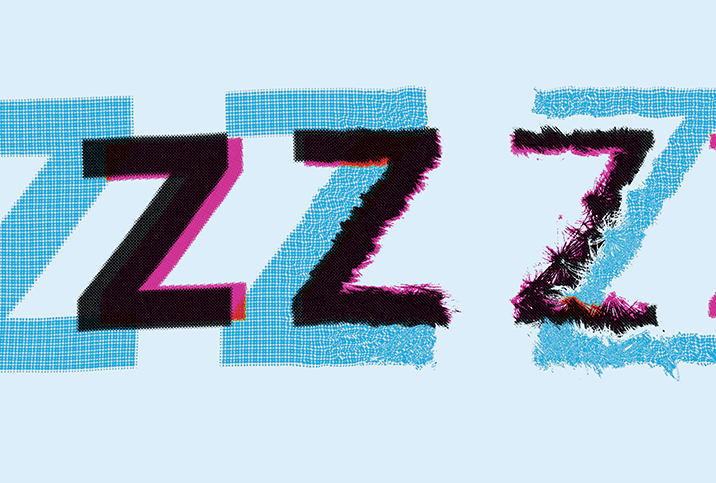Don't Let Bad Slumber Ruin Your Morning Lumber

Lack of sleep has been linked to low libido, infertility and, yes, erectile dysfunction (ED), according to Britney Blair, Psy.D., C.B.S.M., a San Francisco-based clinical psychologist, behavioral sleep medicine specialist and co-founder of the sexual health app Lover.
In other words, low-quality slumber could be affecting your morning lumber.
"One of the reasons it impacts men's sexual health is because of testosterone levels," Blair said. "Lack of sleep can lower testosterone, which affects libido and, ultimately, can affect one's fertility, as well. A lot of things happen when we're sleeping that, overall, support our health."
Sleep is often considered one of the pillars of health, along with nutrition and exercise.
"The more we learn about sleep, the more we learn that it's actually the foundation on which everything else is built," she said.
Factors that contribute to ED
Men who get insufficient sleep or have insomnia force their heart to work harder throughout the day.
"We think that because the heart is not getting a rest at night, it's working harder across the 24-hour day," Blair said. "It puts people at greater risk for heart disease. Your erectile health is directly impacted by your cardiovascular health."
Studies have shown that not getting enough sleep increases a man's risk for prediabetes, high blood pressure and heart disease, according to John Neustadt, N.D., founder and president of NBI, a dietary supplement manufacturer based in San Diego. These are all risk factors for erectile dysfunction.
Neustadt said poor sleep creates a feeling of fatigue, which contributes to decreased sexual desire.
"[Lack of sleep] squashes a man's libido and can contribute to not just loss of sexual desire but decreased sexual function," he said. "Even when testosterone is normal, research has found that men who are not getting enough sleep still have decreased sex drive."
In some cases, resolving erectile dysfunction could be as simple as getting more sleep, Neustadt said, adding that the optimal amount of sleep is approximately seven and a half to eight hours per night. However, one man out of every five sleeps less than six and a half hours a night.
Psychological effects
Men who suffer from lack of sleep and insomnia can have mood disorders, said T. Mike Hsieh, M.D., a professor of urology and the director of the Men's Health Center at University of California San Diego Health.
"Sleeping disturbances can also be a sign of depression," he said. "Add in the psychological impact, the cardiovascular impact, the hormonal impact, and basically you end up with people with sexual health problems."
Because sleep deprivation can have a negative effect on sexual desire and performance, it may also lower a man's self-esteem, Neustadt added.
If you sleep insufficiently, you're more likely to be irritable and stressed out. In fact, stress kills libido in 85 percent of people, and not sleeping well increases stress, said Blair, who added that stress causes sexual desire to plummet.
Getting healthy sleep is one of the best things men can do to decrease stress.
"There's a process that happens when you're sleeping where there's a neurochemical bath in the brain and it ameliorates negative emotions," she said. "A lot of people will talk about being stressed out or upset about something. They go to bed and then the next morning, not only are they not stressed out about it, but they've got some solutions that they've worked through over the course of their sleep."
Tips for a better night's sleep
Exercising regularly and vigorously is effective in relieving insomnia. For a better night's sleep, Blair recommends eating a healthy diet of fruits and vegetables, eschewing processed foods and limiting meat consumption. And avoid drinking sodas because they contain phosphates, which are brutal for cardiovascular health and make erections more challenging.
"Anything that's good for your heart is great for your sex and great for your sleep," she said.
Having a substantial amount of brain stimulation during the day may help you sleep better.
"The brain burns bunches of calories," Blair said. "Allowing your brain to bite into something and chew on it is really helpful."
Waking up at the same time every day is vital, because this routine anchors and strengthens your biological clock.
Factors that affect sleep
If you're waking up in the middle of the night due to acid reflux symptoms, such as a burning in your chest or a dry cough, Neustadt recommends you look at your diet. Eliminating foods and beverages that cause acid reflux—citrus, coffee, garlic, tomatoes—can help.
Some men wake up to urinate because of benign prostatic hyperplasia (BPH), or an enlarged prostate gland; others may be drinking too much before they go to bed. Neustadt suggests refraining from drinking any beverages for a couple of hours before you go to bed. While some men drink alcohol to help them fall asleep, it's actually counterproductive.
"It's not a healthy way to improve sleep," he said.
Some medications can create insomnia. Beta blockers, such as metoprolol, deplete melatonin, the hormone that plays a role in sleep. Glucocorticoids (e.g., prednisone) and antidepressants can contribute to insomnia, as well.
"Take a look at the medications and make sure you talk about that with your doctor and your pharmacist to see if they can affect your sleep," Neustadt said.
Hsieh said referring patients with sleep problems to a sleep medicine specialist is important, because he doesn't think just recommending sleeping pills is the right approach.
Sleep apnea correlated with ED
A 2016 study in the journal Aging Male found ED in 63 percent of participants with obstructive sleep apnea, a common sleep disorder caused by the collapse of the upper airway. Apnea can lead to waking up in the middle of the night gasping for air.
Hsieh said sleep apnea is probably the most well understood and correctable sleep disorder, as well as likely having the most overlapping features with erectile dysfunction, because most sufferers are overweight and have other kinds of vascular problems.
Sleep specialists can conduct a sleep study and diagnose men with sleep apnea. A continuous positive airway pressure (CPAP) machine often solves a lot of their problems, Hsieh said.
Blair said she often talks to sleep patients about treatment compliance with their CPAP or mouthguard.
"It's very hard to get people to comply with treatment until I tell them that they're at risk for ED if their apnea goes untreated," she said. "All of a sudden, their treatment scores are perfect. It's pretty funny."


















